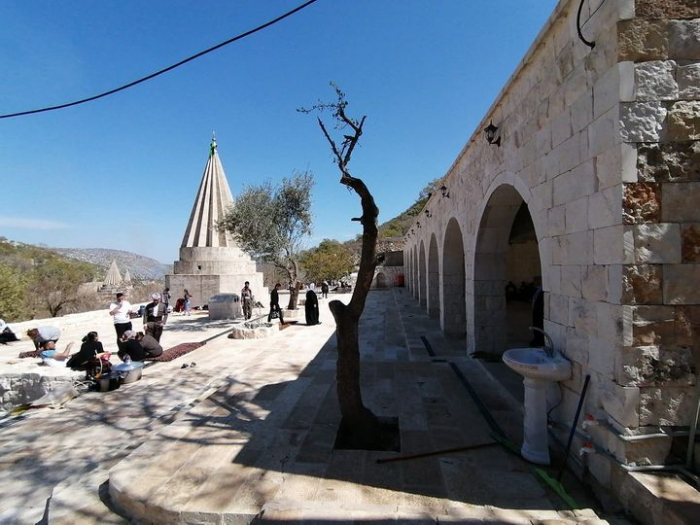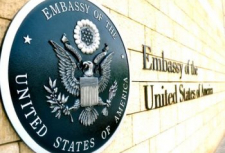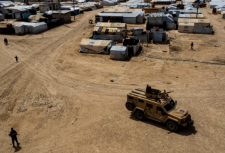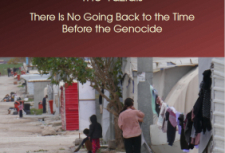Reconstruction of Shangal is hindered by political conflicts

Human Rights Watch (HRW) pointed out in its report on Shangal that political conflicts between Erbil and Baghdad are preventing the reconstruction of Shangal, a Yazidi population site destroyed after the 2014 ISIS attack.
Iraqi Prime Minister Muhammad Shia al-Sudani announced in April 2023 that his government had allocated 50 billion Iraqi dinars to build Shangal, but political conflicts between Kurdistan and Iraq have prevented the fund from being used and prevented the displacement of more than 200,000 Yazidis who have been in poverty since 2014.
Sarah Sanbar, HRW researcher on Iraq, said that the funds allocated to Shangal would be useful if they were used for the benefit of the people as the people of Shangal are in an uncertain situation and political conflicts prevent the use of the available funds.
70% of the Yazidi houses were destroyed
According to a 2014-2017 report by the International Organization for Migration (IOM) in Shangal, 80 percent of the area's general infrastructure and 70 percent of homes were destroyed during the war against ISIS.
Lack of water and electricity also remains a vital issue. Residents of Shangal state that they have irregular electricity and water supplies, with one villager stating that they pay $11 a day for drinking water. Local residents also pointed out that many educational and medical institutions are still in a state of disrepair and that these institutions are understaffed.
Barriers to Returns
According to the HRW report, all interviewees cited the "unstable security situation," "government inability to help destroyed homes and businesses," and "lack of adequate government services" as barriers to return.
Hundreds of teachers are needed for education, which is not easy because of the destruction and damage to schools. Only 96 of Sinjar's 206 schools can be used. Due to the shortage of schools and teachers, schools with a maximum capacity of 400 have between 600 and 1,000 students.
According to local reports, some schools are used as bases by armed groups. Three schools are used as military bases by armed groups, disrupting learning and putting the school infrastructure at risk of attack.
12 armed groups fight for control of Shangal
In addition, government efforts to regain administrative control of the region and military conflicts in May 2022 led to violent clashes and new displacements.
Only 2 hospitals provide services
The HRW report highlighted that in addition to the provision of education and services, there are also shortcomings in health care, there are currently only 2 hospitals in Shangal, and the capacity of these hospitals to treat complex situations is low.
Interviewees state that the lack of access to medical services is a serious obstacle to the return of the Yazidi population, especially for pregnant women and people with chronic illnesses.
Dengê Êzdia
Tags: #ezidi #shangal #sindjar #yezidis #yazidis
Reconstruction of Shangal is hindered by political conflicts

Human Rights Watch (HRW) pointed out in its report on Shangal that political conflicts between Erbil and Baghdad are preventing the reconstruction of Shangal, a Yazidi population site destroyed after the 2014 ISIS attack.
Iraqi Prime Minister Muhammad Shia al-Sudani announced in April 2023 that his government had allocated 50 billion Iraqi dinars to build Shangal, but political conflicts between Kurdistan and Iraq have prevented the fund from being used and prevented the displacement of more than 200,000 Yazidis who have been in poverty since 2014.
Sarah Sanbar, HRW researcher on Iraq, said that the funds allocated to Shangal would be useful if they were used for the benefit of the people as the people of Shangal are in an uncertain situation and political conflicts prevent the use of the available funds.
70% of the Yazidi houses were destroyed
According to a 2014-2017 report by the International Organization for Migration (IOM) in Shangal, 80 percent of the area's general infrastructure and 70 percent of homes were destroyed during the war against ISIS.
Lack of water and electricity also remains a vital issue. Residents of Shangal state that they have irregular electricity and water supplies, with one villager stating that they pay $11 a day for drinking water. Local residents also pointed out that many educational and medical institutions are still in a state of disrepair and that these institutions are understaffed.
Barriers to Returns
According to the HRW report, all interviewees cited the "unstable security situation," "government inability to help destroyed homes and businesses," and "lack of adequate government services" as barriers to return.
Hundreds of teachers are needed for education, which is not easy because of the destruction and damage to schools. Only 96 of Sinjar's 206 schools can be used. Due to the shortage of schools and teachers, schools with a maximum capacity of 400 have between 600 and 1,000 students.
According to local reports, some schools are used as bases by armed groups. Three schools are used as military bases by armed groups, disrupting learning and putting the school infrastructure at risk of attack.
12 armed groups fight for control of Shangal
In addition, government efforts to regain administrative control of the region and military conflicts in May 2022 led to violent clashes and new displacements.
Only 2 hospitals provide services
The HRW report highlighted that in addition to the provision of education and services, there are also shortcomings in health care, there are currently only 2 hospitals in Shangal, and the capacity of these hospitals to treat complex situations is low.
Interviewees state that the lack of access to medical services is a serious obstacle to the return of the Yazidi population, especially for pregnant women and people with chronic illnesses.
Dengê Êzdia
Tags: #ezidi #shangal #sindjar #yezidis #yazidis


























